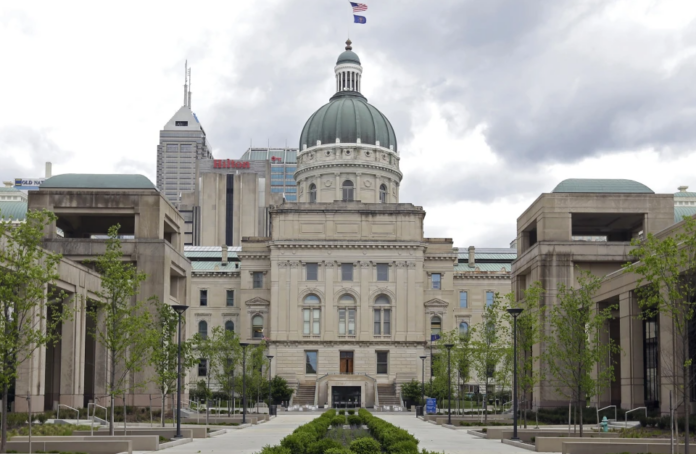INDIANAPOLIS (AP) — Keep it short. That has been the directive from leadership in Indiana leading up to the 2024 legislative session.
But with the approaching 2024 general election and following landmark conservative legislation in recent years, including a near-total ban on abortion, a wide expansion on school vouchers and a law restricting the use of students’ preferred pronouns in schools, that might not take place.
It’s likely legislation on similar social issues will reach the floor again, even while leaders of the state’s Republican trifecta say they want a session of “fine-tuning” policy.
Here is what is and isn’t expected this year.
The session beginning Jan. 8 must adjourn by March 14 and will be closed to items with a fiscal impact. Indiana holds longer, budget-making sessions during odd years.
The consistent top priority across the statehouse and political aisle this year is improving literacy and education outcomes following significant setbacks from the pandemic. About 18% of third graders did not pass Indiana’s reading test last year, according to the Department of Education.
Indiana policy is to hold back students who do not pass the test, but GOP lawmakers say exemptions allow students to easily move on to the next grade and want to tighten the regulation. More than 96% of students who did not pass the reading test were advanced to the fourth grade, the education department reported.
Critics say class sizes are at risk of becoming unmanageable and schools will not have the appropriate staff or resources to keep up should legislation cause more students to repeat grades.
Truancy also has been a focus for lawmakers going into the new year. About 1 in 5 students were chronically absent from Indiana schools during the 2022-2023 year, meaning they missed about three and a half weeks of class, according to department data.
Bipartisan concern has been leveled at the cost and availability of early childcare in Indiana. Republican leaders have indicated interest in easing regulations to make it easier to open and operate childcare facilities, while Democratic lawmakers have called for a childcare tax credit.
“Daycare is a constant challenge from the Ohio River to the Michigan line,” Senate President Pro Tem Rodric Bray, a Republican, said in a speech outlining priorities in November.
Huston also put antisemitism on college campuses in his top priorities in light of the Israel-Hamas war.
He wants to pass a measure to define antisemitism as religious discrimination and “provide educational opportunities free of religious discrimination.” A House bill with the same language died in the Senate during the 2023 session.
“Our Jewish students should know they will be safe on campuses throughout Indiana and not be subjected to antisemitic teaching or materials,” Huston said during a speech in November.
Gov. Eric Holcomb plans to announce his agenda in the upcoming weeks. His term will end in 2024 because Indiana law does not allow governors to serve more than two successive terms.
The Republican governor who received widespread attention for his 2023 public health proposal allowing counties to opt in for funding on services, such as chronic disease prevention, has hinted at early education and workforce development priorities for his final legislative session.
Republican leaders have been quiet on a number of hot button subjects on the heels of recent laws that made national headlines. With half of the state’s senators and all of its representatives up for reelection in 2024, some lawmakers may attempt to raise their profiles with bills addressing topics such as reproduction or gender that have been similarly enacted in other Republican-led states.
Indiana’s primary election is May 7.
State Senate Democratic leader Greg Taylor said his party will keep “social issues” off the table.
“We’re going to be in a defensive posture,” he said at a panel in November.
However, Republicans continue to enjoy supermajority control in both chambers as they have since the 2012 elections.
Hoosiers can expect no movement on two subjects: gambling and marijuana legalization.
Top Republican leaders said gambling measures are off the table after a former lawmaker recently pleaded guilty to accepting the promise of lucrative employment from a casino company in return for favorable action in the general assembly in 2019.
Marijuana legislation is also unlikely to see any movement in the upcoming year, even as Indiana becomes increasingly marooned by pot-friendly states including Ohio, where voters approved adult recreational use in November through a citizen initiative.





